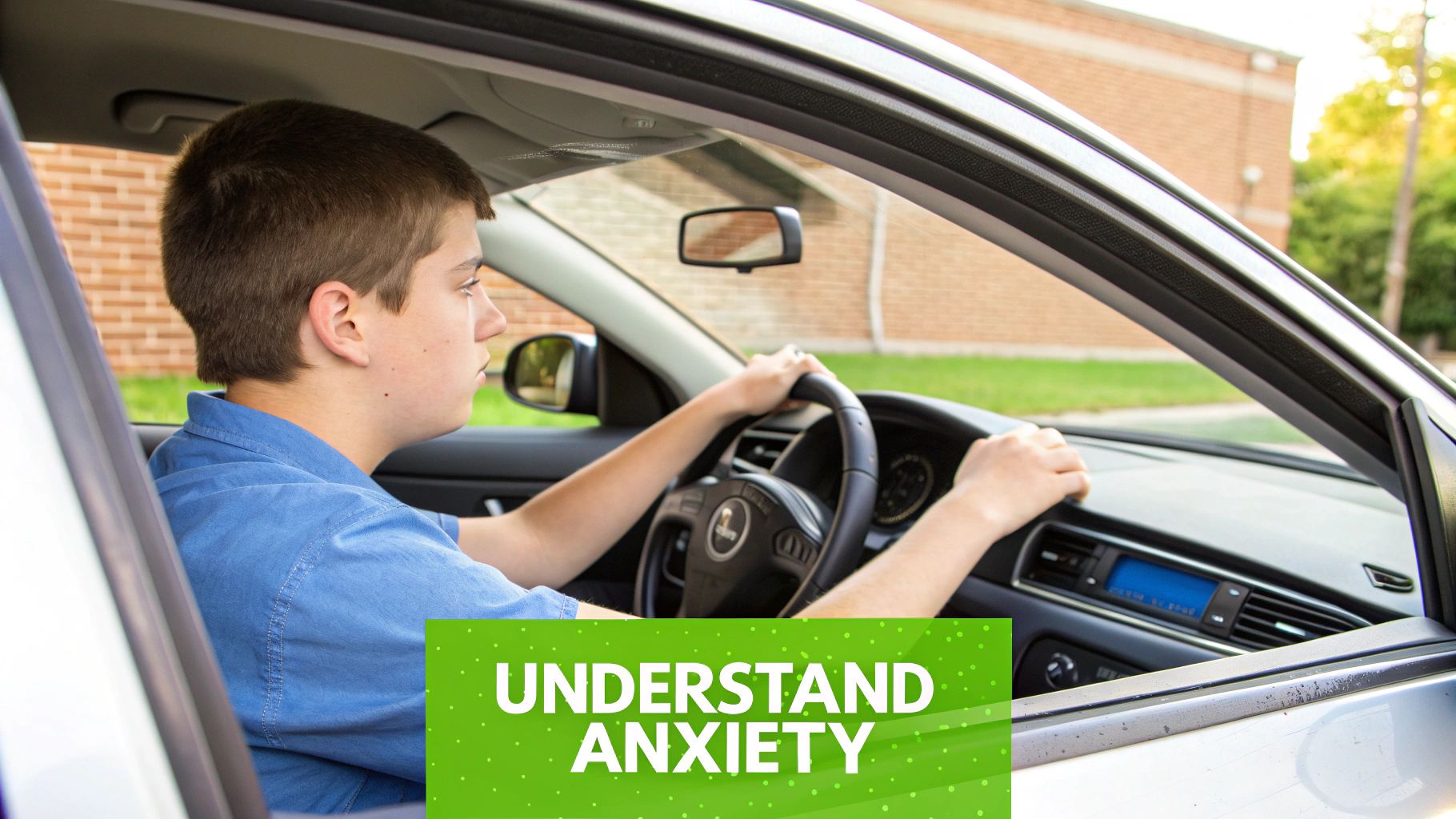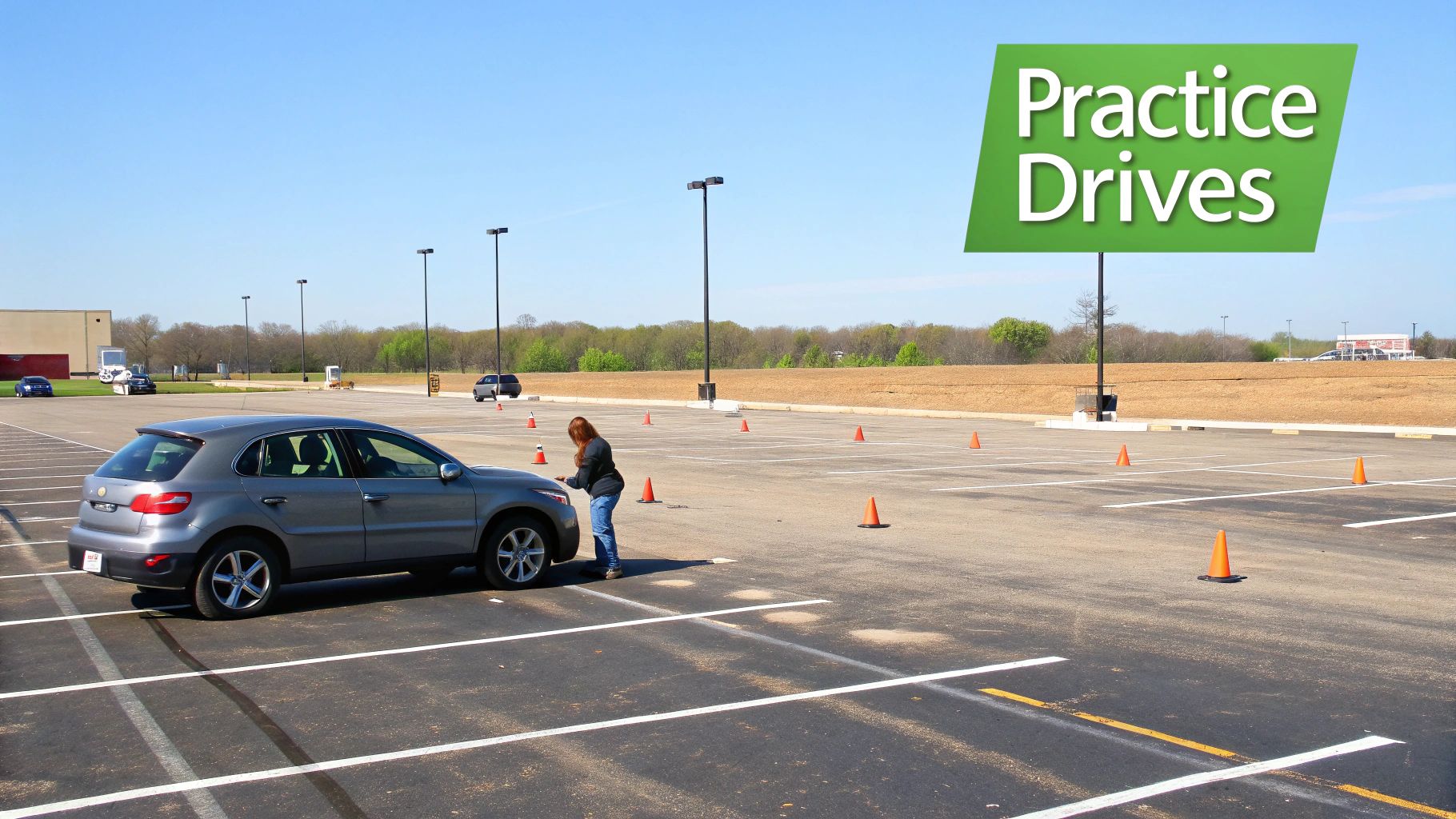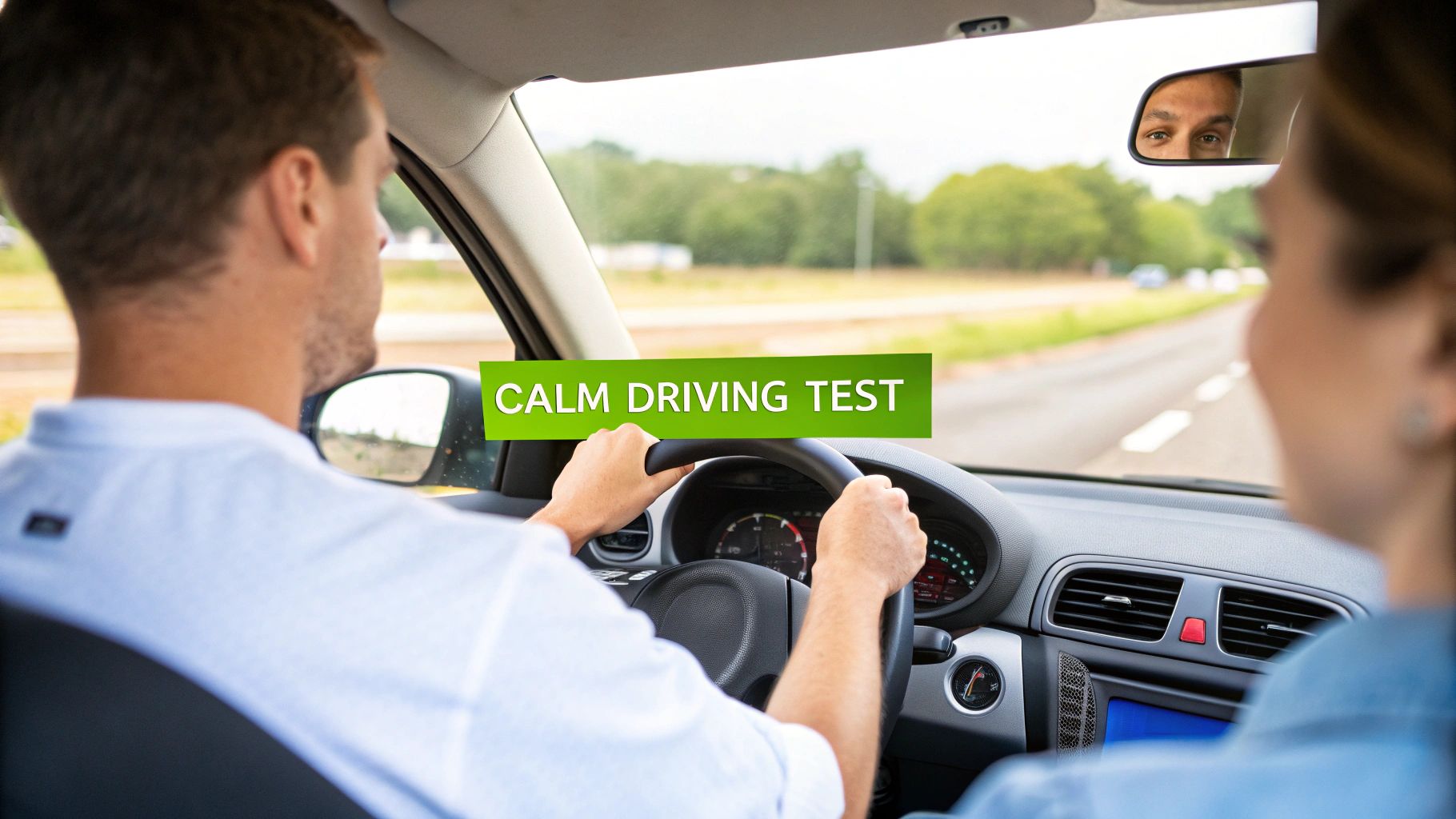It’s a familiar feeling, isn’t it? The racing heart, the sweaty palms, the knot in your stomach as your driving test looms. Let me be the first to tell you that this is completely, one hundred percent normal. The key isn't to pretend you're not nervous; it's to learn how to manage that nervous energy by focusing on what's actually in your control: your preparation, your mindset, and even your breathing.
Recognising that these feelings are just a natural reaction to a high-pressure situation is the first, and most important, step.
Why Feeling Nervous Before Your Driving Test is Perfectly Fine
If the mere thought of that practical test sends your anxiety spiking, you're in very good company. This isn't a sign you're a bad driver or that you're going to fail. Honestly, it’s a logical response to a situation where you know you're being scrutinised. Getting to the root of why you feel this way is the secret to getting a handle on it.
Your body’s ancient ‘fight-or-flight’ response is brilliant for dealing with actual danger, but it can’t tell the difference between a genuine threat and a driving examiner holding a clipboard. It just senses pressure and floods your system with adrenaline, which leads to all those classic symptoms.
- Shaky hands and legs: That’s just adrenaline getting your muscles ready for action.
- A thumping heart: Your body is simply pushing more oxygen to your brain and limbs.
- A foggy brain: Your focus can narrow under stress, making it tricky to process everything at once.
While the physical side is uncomfortable, it's often the mental chatter that causes the real problems. The fear of making one tiny mistake, the pressure of being watched in silence, and the sheer desire to finally get that pink licence all mix together into one potent cocktail of stress.
The Unique Pressure of Test Day
Think about it – the entire setup of a driving test is a bit of a psychological pressure cooker. You’re being asked to perform skills you’ve practised for hours, but in a totally different, high-stakes environment. This isn't just another lesson with your friendly instructor; this is the final exam.
Here's the most important thing to grasp: nerves aren't your enemy. They're just energy. Your goal shouldn't be to get rid of them completely, but to learn how to channel that energy into heightened focus and awareness. Turn the potential for panic into your peak performance.
This mental switch is incredibly powerful. Instead of letting your brain spiral with "I'm so nervous, I'm definitely going to fail," try reframing it. Think, "Okay, my body is getting itself ready for this important moment." This simple change in perspective can take away so much of the power that anxiety holds over you.
And it's not just you. Data shows just how common this is for UK learners. Studies consistently find that around 30% of candidates report feeling significant anxiety. These surveys, and the official driving test statistics from GOV.UK, show that nerves are at their worst just before and during the test itself – right when they can cause the most disruption.
Let's look at how specific anxieties match up with the calming techniques we'll cover.
Your Guide to Nerves vs Calming Techniques
| Common Anxiety Trigger | Effective Calming Strategy |
|---|---|
| Fear of the unknown test routes | Drive a variety of local roads, not just memorised routes. |
| Making a small mistake and spiralling | Use the "five-second rule" to reset your focus immediately. |
| The examiner's silence and clipboard | Remember they are human and want you to pass. Their silence is professional. |
| Physical symptoms like shaking or a racing heart | Practise deep breathing exercises before and during the test. |
| Forgetting a manoeuvre under pressure | Visualise yourself completing each manoeuvre perfectly before the test. |
| Pressure from friends and family | Keep your test date private to avoid added external pressure. |
This table gives you a quick snapshot, but this guide is designed to give you a full toolkit of practical strategies. We're going to dive into how to build genuine confidence (not false bravado), create a rock-solid pre-test routine, and use specific techniques to stay calm and collected behind the wheel. You’ve already put in the hours and learned the skills; now it's time to build the mindset to match.
Build Rock-Solid Confidence Through Smart Preparation

While breathing exercises and positive thinking certainly have their place, nothing crushes driving test nerves quite like genuine, hard-earned confidence. This isn't about just telling yourself you'll be fine; it's about building a deep, unshakable belief in your own ability, grounded in preparation that goes way beyond your standard lessons.
True readiness comes from proving to yourself, over and over, that you can handle whatever the road throws at you. The aim is to turn those clunky, conscious actions into smooth, automatic skills. This frees up your brain to focus on observing and reacting when it truly matters.
Recreate the Test Experience with Mock Exams
One of the most powerful things you can do is a proper mock driving test. And I mean proper. For it to really work its magic, it needs to be as close to the real deal as possible. Ask your instructor to run one for you under strict exam conditions.
Here’s what that should look like:
- Complete Silence: No hints, no chit-chat, no "don't forget your mirror check." Just directions, exactly as the examiner will give them.
- Unfamiliar Roads: It's easy to look good on the roads you drive every week. A real mock test should throw you onto routes you don't know, forcing you to adapt just like you will on the day.
- Time it Right: Is your test booked for 10 am on a Tuesday? Try to do your mock at the same time. This gives you a priceless feel for the specific traffic and road conditions you’re likely to face.
Going through this process helps to demystify the whole thing. It turns a scary, unknown event into a familiar routine, which is a brilliant way to settle your nerves before the big day even arrives.
Over-Practice the Tricky Bits Until They're Automatic
We all know the manoeuvres that cause sweaty palms—parallel parking, reversing into a bay, you name it. The secret here is to practise them until they become completely second nature. Don't just practise until you get them right; practise them until you simply can't get them wrong.
When a manoeuvre becomes muscle memory, you stop wasting precious mental energy thinking about every single step. That mental space is then freed up for what's truly important during your test: constant observation, checking your mirrors, and being aware of everything happening around you.
The real point of all this preparation is to build up a bank of evidence that you are a capable, safe driver. Every successful mock test and every perfectly executed manoeuvre is another deposit in that bank, quieting the anxious voice in your head.
This kind of focused practice genuinely works. In fact, combining mock tests with lessons that specifically address stress management has been shown to improve pass rates by as much as 10%. By methodically building your skills, you're actively stacking the odds in your favour. You can dig into the numbers and understand the official driving test data on GOV.UK.
Ultimately, you can't just switch confidence on. It’s the natural outcome of knowing you’ve put in the hard graft. When you've already faced the silence, navigated tricky new junctions, and nailed that reverse park dozens of times, you walk into the test centre knowing you’re not just hoping to pass—you’re prepared to pass.
Your Game Plan for the Day Before the Test

How you handle the 24 hours leading up to your driving test can genuinely make or break your performance. It's not about cramming; it's about getting yourself into a calm, organised headspace. Think of it as creating the perfect conditions to let your driving skills shine.
The most common trap learners fall into is treating the day before like a frantic, last-minute revision session. Trying to jam in one more lesson to nail that parallel park will likely just crank up your anxiety and leave you second-guessing everything you know. It often does more harm than good.
If you absolutely must get behind the wheel, make sure it’s a light, relaxed drive. Go with your instructor down some familiar, easy roads. The point isn't to learn anything new, but simply to remind yourself that you are a capable driver. It's about reinforcing that feeling of being in control, not sparking last-minute panic.
Get Organised for a Calmer Morning
One of the simplest ways to soothe your nerves is to remove any potential for last-minute chaos. Getting all your bits and pieces together the night before means you wake up with one less thing on your mind. It’s a small act of organisation, but it has a massive impact on your morning mindset.
Here's what you should get ready:
- Your Essentials: Lay out your provisional licence and your theory test pass certificate. Put them somewhere obvious, like by the front door, so you can't possibly forget them.
- Your Test Day Outfit: Decide what you're wearing. Pick clothes and, most importantly, shoes you've driven in countless times and know are comfortable. This is not the day to break in new boots or wear a jacket that restricts your arm movement.
- The Logistics: Double-check the test centre address and the time of your test. Plan your route and know exactly when you need to leave. Wiping out these little unknowns prevents a major source of stress.
Fuel Your Brain and Body
Your ability to concentrate and keep anxiety in check is directly linked to how you eat, drink, and sleep. Getting proper rest is probably the most crucial part of your prep. Understanding how quality sleep can help decrease stress can be a game-changer. A solid night's sleep helps keep you sharp and emotionally balanced.
A great tip is to try a bit of visualisation. Before you go to sleep, spend 10-15 minutes quietly picturing the test going smoothly. Imagine yourself pulling away calmly, nailing a manoeuvre, and handling a tricky junction with confidence. This isn't just wishful thinking; it's a way of mentally rehearsing for success.
Don't forget to have a proper meal and drink plenty of water. It's best to steer clear of too much caffeine or sugar, as they can cause jitters and mimic the physical feelings of anxiety. A calm body really does help create a calm mind, giving you the best possible foundation to show the examiner what you can do.
Practical Techniques for Test Day Composure
The day of your test is when all your hard work and practice truly come together. Now, it’s less about learning and more about performing. This is where you can use a few smart techniques to manage those inevitable nerves, keeping you cool and collected from the moment you arrive at the test centre.
Start your day with a brain-friendly breakfast. You’ll want to steer clear of anything that might make you feel more anxious. A sugary bowl of cereal or a big, strong coffee can give you the jitters and lead to an energy crash later on – the last thing you need when you're trying to concentrate.
Instead, go for something that provides slow-release energy. Think whole-grain toast with a banana, or a small bowl of porridge. This will help keep your blood sugar levels stable, which in turn helps keep your mind clear and focused.
Staying Grounded Before You Drive
That final hour before your test is crucial for setting the right tone. Forget about frantic, last-minute cramming of the Highway Code. It won't help now. A much better idea is to go for a short, brisk walk to burn off some of that nervous energy.
Putting on a favourite calming playlist or an interesting podcast can also work wonders. It’s a simple but effective way to shift your focus away from those anxious "what if" thoughts. It’s all about finding what works for you and making it a conscious part of your pre-test routine.
If you struggle with general anxiety, you might find that listening to calming stories for anxiety in the days leading up to your test can help lower your baseline stress levels, making the test day itself feel more manageable.
Once you’re in the waiting room, or even just sitting in the car with your instructor, there's a powerful but discreet breathing technique you can use called ‘box breathing’. It's incredibly simple:
- Breathe in slowly through your nose for a count of four.
- Hold that breath for a count of four.
- Exhale slowly through your mouth, again for a count of four.
- Hold your breath for a final count of four.
Just repeating this cycle three or four times can make a huge difference. It cleverly nudges your body out of its ‘fight-or-flight’ mode and settles your nervous system right down. The best part? No one will even know you're doing it. For a few more ideas, it's worth exploring other expert tips on how to relax before your driving test.
Interacting with Your Examiner and Handling Mistakes
It’s so important to remember that your driving examiner is just a person doing their job. They aren't there to catch you out or trick you; their only goal is to assess if you're a safe driver.
A simple, polite "good morning" can really help to break the ice and create a more comfortable atmosphere in the car. They fully expect you to be nervous – pretty much everyone is!
The infographic below shows a brilliant mental flow for building a positive mindset, combining powerful visualisation techniques with positive self-talk.
This kind of mental prep helps to cement all the practice you've put in and builds a solid foundation of self-belief right before you pull away from the test centre.
Now, let's tackle the biggest fear of all: making a mistake. You must understand that a minor fault is not an automatic fail. Stalling at a junction or even taking a wrong turn doesn't mean your test is over.
The most important thing isn't the mistake itself, but how you recover from it. Take a deep breath, handle the situation safely (restart the car, check your mirrors, listen to the new direction), and immediately refocus on the road ahead. A calm, safe recovery often impresses an examiner far more than a flawless but tense drive.
What to Do if You Don't Pass (and How to Plan Your Comeback)

Let's tackle the elephant in the room: what happens if you fail? It’s the single biggest worry for most learners, and the disappointment can feel crushing in the moment. But it's crucial to understand that failing a driving test is not a reflection of your worth or intelligence.
Think of it this way: instead of a failure, you’ve just been given an expert-led diagnostic of your driving. You now have a precise list of what needs a little more polish. Plenty of the safest, most confident drivers you see on the road today didn’t get their licence on the first try. Having a plan for this outcome before you even start the test is one of the best ways to manage that fear.
Turning Feedback into Fuel
The feedback you get from the examiner right after the test is pure gold. It’s so easy to let your emotions take over and just zone out, but try your best to listen carefully to what they're telling you.
Your instructor will be right there with you, and their job is to help you decipher everything. Once the examiner has finished, take five minutes with your instructor to go through the feedback form together. They'll translate the official jargon into real-world driving actions, giving you a clear understanding of what went wrong and why.
Building Your Retest Strategy
After the initial sting wears off, it's time to get strategic. The goal isn't to start all over again, but to double down on the specific areas that need work. Hold off on immediately rebooking your test – give yourself time to make a solid plan first.
Here’s a practical approach to get you back on track:
- Pinpoint the problems: Look at your test report. Was it hesitation at junctions? A slip-up on the reverse bay park? Get really specific about the faults.
- Book targeted lessons: Ask your instructor for lessons that focus entirely on those weaker areas. If roundabouts were the issue, dedicate a whole session to tackling every type of roundabout you can find.
- Finish on a high: Always try to end your practice sessions by successfully doing something you’re good at. It’s a small trick, but it does wonders for rebuilding your self-belief.
A failed test offers something incredibly valuable: clarity. It takes away all the guesswork and gives you a laser-focused plan for what to work on next. Use that information, and you'll turn a setback into a springboard for success.
Remember, getting that pass certificate is an achievable goal for everyone. In fact, data from early 2025 showed the pass rate climbed to 48.9%, a significant jump from the year before. You can read more about these UK pass rate trends on RAC.co.uk, which shows just how much good preparation pays off.
For a more in-depth guide, we've got a whole article on what to do after failing a driving test. Going through this process can genuinely make you a much safer and more aware driver in the long run.
Got Questions About Driving Test Nerves? We've Got Answers
Even when you feel you've prepared for everything, a few specific worries always seem to creep in as the big day approaches. Let's tackle some of the most common questions we hear from learners, hopefully putting your mind at ease.
Should I Tell My Examiner I'm Nervous?
This is a really common dilemma, and while it's a personal call, letting your examiner know can actually be a good move. You don’t need to make a big deal of it. A simple, "Just to let you know, I'm feeling a bit nervous today" is all it takes.
Saying it out loud can sometimes take the power out of the feeling. Plus, examiners are people too. They know you're not a robot and fully expect you to have some jitters. They won't mark you down for it – their only job is to see if you can drive safely. Acknowledging your nerves shows a bit of self-awareness and can help break the ice right from the start.
What Happens If I Make a Mistake Early On?
This is the big one, isn't it? The fear of stalling at the first junction and feeling like it's all over. But here’s the most important thing to remember: a single minor fault, especially early on, does not mean you've failed. Your test isn't about delivering a perfect, flawless performance. It's about showing you're a safe, competent driver.
The real test isn't the mistake itself, but how you handle it. If you stall, don't spiral. Just breathe. Secure the car, restart the engine, do your checks properly, and move off when it's safe. A calm, methodical recovery is far more impressive to an examiner than a tense, rigid drive.
How Can I Stop My Legs from Shaking?
Ah, the dreaded jelly legs. That uncontrollable shake is a classic physical reaction to adrenaline – your body's "fight or flight" response doing its thing. It's incredibly common.
Here’s a little trick that can help. Before you even start the engine, plant both of your feet firmly on the car floor for a few seconds. This can help to "ground" you and interrupt the shaking. Make sure your seating position is correct and comfortable, too, as this reduces physical tension. Combine that with a few quiet, deep breaths, and you can often get those physical symptoms back under control.
What Should I Eat Before My Driving Test?
What you eat can genuinely affect your nerves and focus. There are two things you should definitely steer clear of:
- A heavy, greasy meal that will leave you feeling sleepy and sluggish.
- Too much sugar or caffeine, which can mimic the feeling of anxiety with jitters and a racing heart, followed by a crash.
The goal is slow-release energy. Something light but sustaining is perfect. Think whole-grain toast with a banana, or a small bowl of porridge about an hour or two before you're due at the test centre. And don't forget to stay hydrated with water!
The journey to becoming a confident driver looks different for everyone. If you find your anxiety is a constant battle, you might find that specialised driving lessons for nervous drivers can offer the targeted support you need to build that on-the-road confidence.
At Fast Pass Driving Courses, we specialise in getting you test-ready with expert instruction tailored to your needs. If you want to build your confidence and get on the road quickly, explore our intensive and semi-intensive courses today at https://fastpassdrivingcourses.co.uk.

